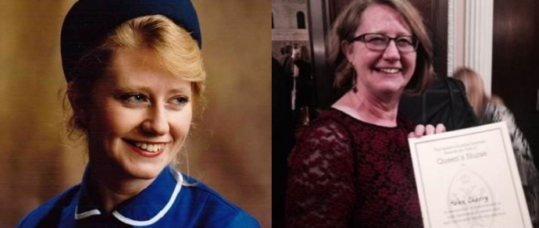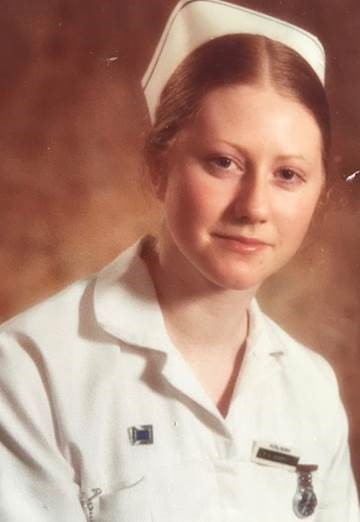Q&A: Helen Cherry, one of Britain’s first deaf nurses

As a child, Helen Cherry was told by her audiologist that the NHS would never accept a deaf nurse. But in 1977, she became one of the first deaf people to work as a nurse in the NHS.
Nursing in Practice caught up with Ms Cherry to find out more about her remarkable career.
Why did you want to become a nurse?
I have bilateral sensorineural deafness, severe to profound, acquired after spate of childhood illness – the usual scenario of measles, chickenpox, mumps and tonsillitis that I suffered around age four before I started school.
But being deaf didn’t stop me from realising my ambition of working overseas and experiencing more of the world.
I had a natural empathy on knowing what it is to be misunderstood and insightful communication is the essence of personalised care. I wanted to be in meaningful work where I could make a difference and improve peoples’ lives when they were in vulnerable situations with their health and wellbeing.
I took up training at Brighton School of Nursing in 1977, who were the first to give me an opportunity knowing I was deaf. Soon after qualifying, I became a district nurse sister in London before heading off to Australia to work for four years and in India for a few months. Whilst abroad, I worked to support people with HIV/AIDS through co-working, personalisation and focusing on the benefits of early interventions – and when I returned to London in 1991, I carried that experience with me through the rest of my career serving as a community health nurse until my retirement from the NHS.
Related Article: Funded nurse workforce plan needed for neighbourhood health services
How does being deaf impact your professional life?
I never think about hearing loss as a loss. It’s given me a natural leaning towards personalised care with empathy, which is valuable as a nurse. I don’t see it as an extra skill but that it is part of me, who I am. Each individual health professional or person working within the service are integral and bring something unique, especially from our own lived experiences and diverse spectra of disabilities.
Too often, not everyone is encouraged to recognise or work to their strengths. Being deaf, my communication skills are my strength: listening, clarifying and paying attention to observational detail to ensure I have captured what is being said or expressed is paramount. This is to ensure that, should I raise something following a meeting or an action someone said they would do, I am not faced with ‘oh you can’t have heard that correctly’.
However, I have chosen not to go into top level management roles that requires attending numerous larger meetings. Why? Being deaf requires a lot of energy to focus all day long and I do not have that stamina as I get older! Deaf fatigue means I prefer roles with a one-to-one focus and smaller teams. It can also impact my response to spontaneous invites to events after work: I might be too tired, or the venue might not have been checked to see if it is acoustically friendly or whether a speech-to-text-reporter (STTR)* is provided if appropriate. At the end of a working day, I love the silence and the option to literally ‘switch off’ (my hearing aids!) and give my brain rest.
 Have you run into any biases among colleagues and employers?
Have you run into any biases among colleagues and employers?
Early in my training, a consultant of a ward I was working on told the sister in charge that he did not want a ‘deaf nurse on his ward’. This was sparked when I stopped him to ask him to face me so I could ensure I understood all his instructions – but he had no patience to stop and face me. I was fortunate that the sister reminded him the ward was hers, not his, and that I was popular with patients as I took time and always clarified everything with them.
I still encounter assumptions and unconscious bias. People have an idea of what deaf looks and sounds like, though I take every opportunity to educate when this comes up. But as people recognise my abilities, the level of discrimination lessens. I no longer experience people joking or wanting to test if I can read their lips, which something that used to happen often alongside assumptions around what I can and can’t do.
What about your relationships with patients?
In all my 42 years of working life, I personally have not encountered patients who have had a problem when I say I am deaf.
I naturally convey back what a patient has said to ensure I have understood. Very often, this provides opportunity for patients with hearing difficulties to open up and learn about hearing aids and the advanced technology from recent years.
Phone calls and voicemails are a big challenge, so I would have colleagues make those calls and then I would follow up with personal visits in the community. Regardless, I believe handling sensitive information face-to-face is a more positive experience for patients, often providing much-needed comfort and empathy.
What can your colleagues and employers do to make your life easier?
Related Article: Nurse had to ‘freeze’ PPE during pandemic to re-use in care home, Covid inquiry hears
I always ensure people understand that they need to face me when speaking, not to cover their mouths (I would not work well in places where face masks worn!) and not talk to me when walking past me, for example.
Once in an interview, they obviously had not read my ‘special request’ where I had been clear that if they positioned themselves in front of window, the light behind them would blank out their faces and I would not be able to lip read. You can imagine my horror when I entered the room to find four people on the panel sitting in front of a window! I had them all stand up and rearrange the room. I did not get the job but would not want to be working in an environment that was not genuine and supportive of diverse needs.
Likewise, I once asked an employer not to interview me by telephone, but the special request had again not been read and I received an email alert with a timed telephone interview. Face-to-face is best, but they could have considered other options such as a Skype call with auto-generated subtitles or remote STTR.
These examples highlight a frequent experience among disabled people: the feeling that ticking boxes and special requests are just a way for employers to cover themselves, as they don’t always actually read the information.
How has technology transformed your life?
In the early days, I was fitted with old analogue hearing aids that I hated wearing, which came with a loud, dull thudding sounds that were sometimes painful. There was no true clarity, just amplified noise that I had to learn to ‘translate’ into meaningful language and match to people’s lip patterns as they spoke. Hospitals are not acoustically friendly places so that was a struggle.
But with the latest hearing aid technology such as my ReSound ENZO 3D hearing aids, I can filter out noise and adjust to accommodate various changes in tone and noise levels. I hear quality sounds now in textured layers of colour. It’s like having my ears cloaked in purple velvet!
My daily frustration is that we have such advanced technology and solutions for inclusive communication, yet these are not always provided.
Related Article: More nursing apprenticeships and changes to student travel expenses
I feel we are on a pendulum swing. When I first started out in nursing, there was little D/deaf awareness, attitudes towards deafness still verged on the ‘deaf and dumb’ bias and assistive tech or other forms of support very limited. Now we have so much more such as Access to Work grants, the Equality Act 2010 to tackle discrimination and support inclusion and, more specifically to the NHS, the Workforce Disability Equality Standard (WDES) that came into force on 1 April 2019 to enable NHS organisations to compare the experiences of disabled and non-disabled staff.
However, these inclusive processes are not always followed or even adhered to, and access has become more complex. For example, I need subtitles for film and videos and STTR at events and conferences. It’s doable, available and yet I experience increased exclusion daily. When this is not provided and I request it, the response is as if I am an inconvenience or an additional cost, which totally misses the richness of lived benefits and experiences that those with a disability can bring to the table.
*STTR is a service provided by skilled stenographer using phonetic keyboard to type verbatim what is being said.
Helen Cherry has partnered with ReSound to challenge perceptions of what is possible with hearing loss and to celebrate 150 years of GN Hearing as an innovator of hearing solutions.

See how our symptom tool can help you make better sense of patient presentations
Click here to search a symptom


As a child, Helen Cherry was told by her audiologist that the NHS would never accept a deaf nurse. But in 1977, she became one of the first deaf people to work as a nurse in the NHS. Nursing in Practice caught up with Ms Cherry to find out more about her remarkable career.



